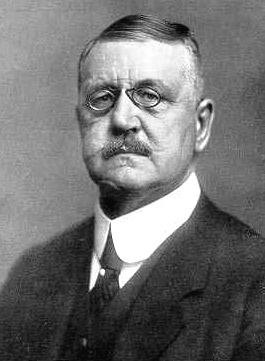<Back to Index>
- Geologist Johan Georg Forchhammer, 1794
- Painter Vladimir Lukich Borovikovsky, 1757
- Prussian Nationalist Politician Wolfgang Kapp, 1858
PAGE SPONSOR


Wolfgang Kapp (24 July 1858 – 12 June 1922) was a Prussian civil servant and journalist. He was a strict nationalist, and a nominal leader of the so-called Kapp Putsch.
Kapp was born in New York City, where his father Friedrich Kapp, a political activist and later Reichstag delegate for the National Liberal Party, settled after the failed revolutions of 1848. In 1870 the family returned to Germany and Kapp's schooling continued in Berlin at the Friedrich - Wilhelm - Gymnasium (High School). Wolfgang Kapp married Margarete Rosenow in 1884, the couple would have three children. Through his wife's family, Kapp acquired a family connection with politically conservative elements. In 1886 he graduated at the conclusion of his law studies at the University of Tübingen and was appointed to a position in the Finance Ministry the same year.
After an ordinary official career, Kapp became the founder of the Agricultural Credit Institute in East Prussia which achieved great success in promoting the prosperity of landowners and farmers in that province. He was consequently in close touch with the Junkers of East Prussia, and during the First World War made himself their mouthpiece in an attack on Chancellor Bethmann Hollweg. Kapp's pamphlet, entitled Die Nationalen Kreise und der Reichskanzler and published in the early summer of 1916, criticized German foreign and domestic policy under Bethmann Hollweg. This pamphlet appeared about the same time as the attacks of “Junius Alter” and evoked an indignant reply from Bethmann Hollweg in the Reichstag, in which he spoke of “loathsome abuse and slanders.”
In 1917, along with Alfred von Tirpitz, Kapp founded the “Deutsche Vaterlandspartei” (Fatherland Party), of which he would briefly become Chairman. He was one of a number of prominent figures of the right, including General Ludendorff and Waldemar Pabst, who set up in August 1919 the Nationale Vereinigung (National Union), a right wing think-tank which campaigned for a counter revolution to install a form of conservative militaristic government. The Nationale Vereinigung did not, however, press for the restoration of the monarchy, the Kaiser having bowed to US pressure and left for his exile near Utrecht in November 1918. 1919, which saw the consolidation in Germany of the Weimar Republic, found Kapp a member of the Deutschnationale Volkspartei (National Peoples’ Party).
Germany’s defeat in the First World War was seen by nationalists such as Kapp as a humiliation and a betrayal. He became an exponent of the Dolchstoß legend and a vehement critic of the Treaty of Versailles. In 1919 he was elected to the Reichstag as a monarchist. In March 1920 Hermann Ehrhardt, the leader of the Freikorps known as the Ehrhardt Brigade, attempted to overthrow the government of theWeimar Republic by marching on Berlin, occupying the city, and installing his preferred Government by force. As a figurehead he chose Kapp as Chancellor. General Freiherr Walther von Luettwitz, who commanded the troops in the Berlin area, supported the Coup d'etat with his own troops. The regular army under the command of General Hans von Seeckt, stood inactive. But leading generals informed Luettwitz he should
desist. Also leading conservatives refused invitations to join Kapp's
government. These factors, and the major intervention of a general
strike by the united trade unions, restored the democratic government. When the Coup d'état failed, Kapp fled to Sweden. After two years in exile, he returned to Germany in April 1922 to justify himself in a trial at the Reichsgericht. He died in custody in Leipzig shortly afterwards of cancer.